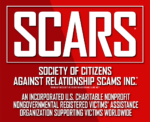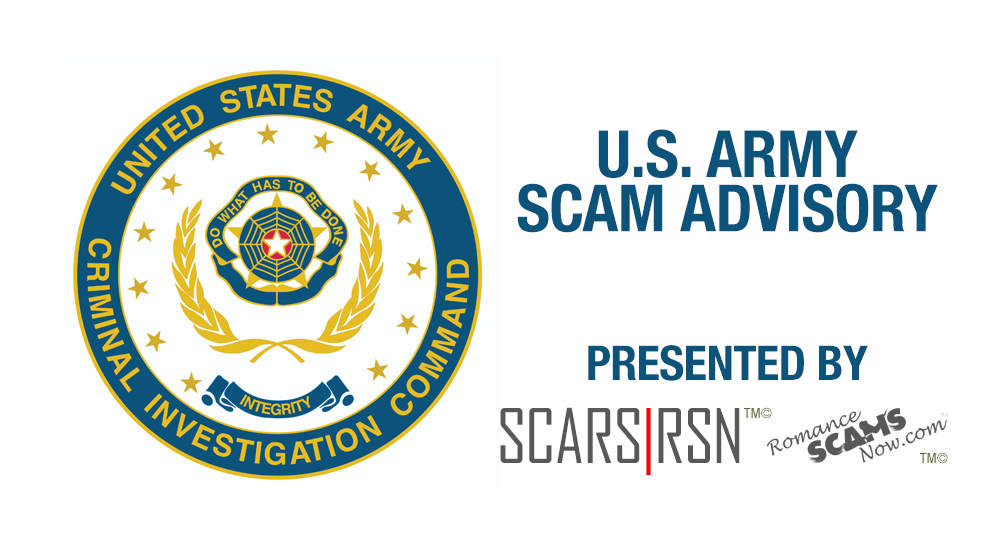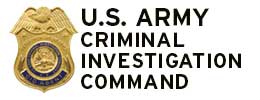SCARS™ Special Report: U.S. Army Warning: Fake Soldiers
Army CID is warning anyone who is involved in online dating to proceed with caution when corresponding with persons claiming to be U.S. Soldiers currently serving in Afghanistan or elsewhere.
The following has been reprinted from the United States Army Criminal Investigation Command
Online Romance Scam Information
Army CID is warning anyone who is involved in online dating to proceed with caution when corresponding with persons claiming to be U.S. Soldiers currently serving in Afghanistan or elsewhere.
Army CID receives hundreds of allegations a month from victims who state they got involved in an online relationship with someone, on a legitimate dating website or other social media website, who claims to be a U.S. Soldier. The “Soldier” then begins asking for money for various false, service-related needs such as transportation costs, communication fees, marriage, processing and medical fees. Victims of these online scams have lost tens of thousands of dollars, with a very low possibility of recovery.
The U.S. has established numerous task force organizations to deal with this growing epidemic; unfortunately, many times the people committing these scams are from African countries using untraceable email addresses, routing accounts through numerous locations around the world and utilizing pay per hour Internet cyber cafes, which often times maintain no accountability of use.
Read the Joint Service Sextortion Brochure for more information and see examples of fake documents used by scammers.
You can also learn more about identity theft, romance scams, sextortion and online impostors at the U.S. Army’s Social Media Resources site.
If you feel you have been scammed by a person claiming to be a U.S. Army Soldier, contact the Federal Trade Commission (FTC) and the Internet Crime Complaint Center (IC3).
For more on these fraudulent acts, read the announcements released by Army CID:
U.S. Army CID Warn Citizens to Be Vigilant Against Internet, Digital Scammers
With National Spotlight on Internet Romance-Type Scams, Army CID Makes Additional Attempts to Warn Unsuspecting Victims
U.S. Army CID Pleads with Public, Warns Against Romance Scams
CID warns Army community about social media impersonation of Soldier accounts
What to look for
- DO NOT SEND MONEY! Be extremely suspicious if you are asked for money for transportation costs, communication fees or marriage processing and medical fees via Western Union.
- If you do start an Internet-based relationship with someone, check them out, research what they are telling you with someone who would know, such as a current or former service member.
- Be very suspicious if you never get to actually speak with the person on the phone or are told you cannot write or receive letters in the mail. Servicemen and women serving overseas will often have an APO or FPO mailing address. Internet or not, service members always appreciate a letter in the mail.
- Many of the negative claims made about the military and the supposed lack of support and services provided to troops overseas are far from reality – check the facts.
- Be very suspicious if you are asked to send money or ship property to a third party or company. Often times the company exists, but has no idea or is not a part of the scam.
- Be very suspicious if the person you are corresponding with wants you to mail anything to an African country.
- Be aware of common spelling, grammatical or language errors in the emails.
- Be very suspicious of someone you have never met and who pledges their love at warp speed.
“Red Flags” – some of the words/phrases used by scammers
Saying they are on a Peace Keeping Mission, looking for an honest woman, parents deceased, wife deceased, child being cared for by nanny or other guardian, profess their love almost immediately, refer to you as “my love,” “my darling” or any other affectionate term almost immediately, telling you they cannot wait to be with you, telling you they cannot talk on the phone or via webcam due to security reasons, or telling you they are sending you something (money, jewelry) through a diplomat. Finally, they claim to be a U.S. Army Soldier; however, their English and grammar do not match that of someone born and raised in the United States.
Here are answers to some of the most common types of scams:
- 1. Soldiers and their loved ones are not charged money so that the Soldier can go on leave.
- 2. No one is required to request leave on behalf of a Soldier.
- 3. A general officer will not correspond with you on behalf of a Soldier planning to take leave.
- 4. A general officer will not be a member of an internet dating site.
- 5. Soldiers are not charged money or taxes to secure communications or leave.
- 6. Soldiers do not need permission to get married.
- 7. Soldiers do not have to pay for early retirement.
- 8. Soldiers have medical insurance for themselves and their immediate family members (spouse and/or children), which pays for their medical costs when treated at health care facilities worldwide – family and friends do not need to pay their medical expenses.
- 9. Military aircraft are not used to transport Privately Owned Vehicles.
- 10. Army financial offices are not used to help Soldiers buy or sell items of any kind.
- 11. Soldiers deployed to combat zones do not need to solicit money from the public to feed or house their troops.
- 12. Deployed Soldiers do not find large sums of money and do not need your help to get that money out of the country.
Where to go for help
Report the theft to the Internet Crime Complaint Center (IC3) (FBI-NW3C Partnership). Online: http://www.ic3.gov/default.aspx
Report the theft to the Federal Trade Commission. Your report helps law enforcement officials across the United States in their investigations. Online: http://www.ftc.gov/idtheft
By phone: 1-877-ID-THEFT (438-4338) or TTY, 1-866-653-4261
By mail: Identity Theft Clearinghouse, Federal Trade Commission, Washington, DC 20580
Report the fraud to the Federal Trade Commission on Nigerian Scams. Email: spam@uce.gov.
Articles and useful links regarding Online Romance Scams
- Brown County Browser: Don’t fall for veterans romance scams
- Fake US Soldiers Robbing Women Online
- How a billion-dollar Internet scam is breaking hearts and bank accounts
- “Prince Charming” Behind Bars: Nigerian Romance Scammer Nets 27-Year Prison Sentence
- Love a man in uniform? Online dating scammers hope so
- Love me don’t: the West African online scam using U.S. Soldiers
- Australian grandmother on drug ice charges in Malaysia: Maria Elvira Pinto Exposto may be victim of a military romance scam
- U.S. Embassy Accra-Ghana
- RomanceScamsNow.com
- Society of Citizens Against Romance Scams [SCARS]
– – –

SCARS™ Team
A SCARS Division
Miami Florida U.S.A.
TAGS: – tags
END
– – –
Tell us about your experiences with Romance Scammers in our Scams Discussion Forum on Facebook »
– – –
FAQ: How Do You Properly Report Scammers?
It is essential that law enforcement knows about scams & scammers, even though there is nothing (in most cases) that they can do.
Always report scams involving money lost or where you received money to:
- Local Police – ask them to take an “informational” police report – say you need it for your insurance
- Your National Police or FBI (www.IC3.gov »)
- The SCARS|CDN™ Cybercriminal Data Network – Worldwide Reporting Network HERE » or on www.Anyscam.com »
This helps your government understand the problem, and allows law enforcement to add scammers on watch lists worldwide.
– – –
Visit our NEW Main SCARS Facebook page for much more information about scams and online crime: www.facebook.com/SCARS.News.And.Information »
To learn more about SCARS visit www.AgainstScams.org
Please be sure to report all scammers HERE » or on www.Anyscam.com »
All original content is Copyright © 1991 – 2020 SCARS All Rights Reserved Worldwide & Webwide – SCARS/Romance Scams Now & SCARS/Society of Citizens Against Relationship Scams are all trademarks of Society of Citizens Against Relationship Scams Incorporated (formerly the Society of Citizens Against Romance Scams)
Legal Notices:
All original content is Copyright © 1991 – 2020 SCARS All Rights Reserved Worldwide & Webwide. Third-party copyrights acknowledge.
SCARS, RSN, Romance Scams Now, SCARS|WORLDWIDE, SCARS|GLOBAL, SCARS, Society of Citizens Against Relationship Scams, Society of Citizens Against Romance Scams, SCARS|ANYSCAM, Project Anyscam, Anyscam, SCARS|GOFCH, GOFCH, SCARS|CHINA, SCARS|CDN, SCARS|UK, SCARS Cybercriminal Data Network, Cobalt Alert, Scam Victims Support Group, are all trademarks of Society of Citizens Against Relationship Scams Incorporated.
Contact the law firm for the Society of Citizens Against Relationship Scams Incorporated by email at legal@AgainstScams.org

















Leave A Comment